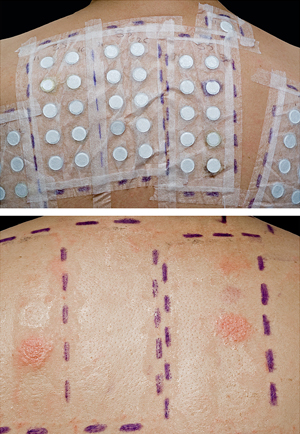Allergy tests are performed to determine what triggers your allergies. This is a critical first step to developing an effective allergy treatment plan.
There are a variety of allergy tests available. A specific allergy test is recommended based on the type of allergy experienced, and other factors.
- Skin tests, including the skin prick test, intradermal skin test and skin patch test
- Blood tests, including IgE levels and RAST Test
- Food Challenge Test
Your doctor will recommend allergy tests based on your symptoms, the suspected allergen (trigger) and other factors.
Each allergy test has potential benefits and drawbacks. The test results alone do not diagnose allergies. All test results must be interpreted together with other symptoms and physical findings.
Skin Tests for Allergies
Skin tests provide rapid results and can cost less than allergy blood tests. However, young children may resist the test and some medications, such as antihistamines, can interfere with allergy skin test results. Speak to your doctor about if you might need to stop any medications prior allergy skin testing.
Skin Prick Test
The skin prick test involves placing a small amount of the suspect allergen on the skin, then pricking the skin so the allergen goes under the surface. Several allergens can be tested at the same time. Different locations of the body may be selected, usually the back, forearm, or upper arm are used.
The doctor observes the skin for swelling and redness of the site of the prick. Results are usually seen within 15-20 minutes. The area that shows an allergic reaction is correlated to the allergen that was applied.
Intradermal Skin Test
This is similar to the skin prick test, but the allergen is injected with a small needle under the surface of the skin. This can provide more accurate results and is usually performed by an allergist. An intradermal skin test may be recommended for those planning to start immunotherapy (allergy shots) to determine the appropriate allergens to use in the injections.

Skin Patch Testing
Skin patch testing is used to determine the cause of allergic reactions on the skin, such as contact dermatitis.
Suspected allergens, such as preservatives, dyes, and glues, are taped to the skin for 48 hours. The doctor observes the area for signs of an allergic reaction at the site where the allergen was applied.
Blood Tests for Allergies
Blood tests are helpful because they involve a single needle prick and medications do not interfere with the results. However, it takes time to get the results and they usually cost more than skin tests. There are many of types of allergy blood tests and some types are more helpful than others.
A blood test may be used to diagnose allergies in the following circumstances:
- For babies and young children for whom a single needle stick to obtain a blood sample may be easier to perform than several skin tests.
- For those taking a medication that cannot be stopped but which can interfere with skin test results
- For those with severe cases of skin conditions, such as eczema or psoriasis, that can make it difficult to interpret skin test results.
- For those with such severe allergy symptoms that skin testing might provoke a severe allergic reaction, such anaphylaxis.
Source: Vivacare
Last updated : 1/8/2019